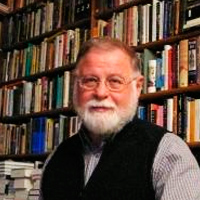 Alberto Manguel is a Canadian writer born in 1948 in Buenos Aires.
Alberto Manguel is a Canadian writer born in 1948 in Buenos Aires.
He grew up in Israel (where his father was an ambassador), and in Argentina, where he was one of Jorge Luis Borges’s readers 152 153 when he became blind at the end of his life.
Manguel then lived in many countries, spending twenty years in Toronto, Canada.
He currently lives in a French village in Poitou, in a rectory, surrounded by 35,000 volumes that constitute his library.
He was a journalist (print, radio, and television) and has published numerous anthologies, novels, translations, and essays. He is the author of numerous nonfiction books.
In 1980, Manguel published The Dictionary of Imaginary Places (co-written with Gianni Guadalupi) which saw great litterary success.
In 1998, A History of Reading received the Medicis Prize (1996). Those two documentary treasures were followed by The Library at Night (2007), Homer’s Iliad and Odyssey: A Biography (2008). His last book, The traveller and the Tower, was published in 2013. In 2001, he was awarded the France- Culture Prize for In the forest to discover the Mirror: An Essay on the words and the world. In 2002, he directed a litterary collection for the French publisher Actes Sud. In 2004, he was appointed Officer of the Order of Arts and Letters, and awarded the Medal of Merit in Argentina in 2007. He has received numerous awards, including the Prix Roger Callois, the Milovan Literary Award, the Premio Cavour Garzani, and the Harbourfront Award for Contribution to the Arts. In 2008, Manguel was the first writer to have given his name to a French school in his lifetime. He chairs the jury of the Cevennes Prize of the European novel, and since 2009 has been part of the jury for the prize of the Bibliothèque Nationale de France (BnF).
Manguel believes in the central importance of the book in societies where, in recent times, the intellectual act has lost most of its prestige.» Libraries (the reservoirs of collective memory) should be our essential symbol, not banks. Humans can be defined as reading animals, come into the world to decipher it and themselves.»
 FR
FR